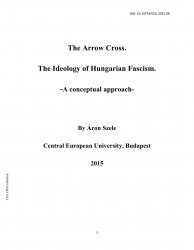The arrow cross: the ideology of Hungarian fascism: a conceptual approach
- Добавил: GYGLEBOOKS
- Дата: 24-11-2024, 17:00
- Комментариев: 0

Название: The arrow cross : the ideology of Hungarian fascism : a conceptual approach
Автор: Aron Szele
Издательство: CEU
Год: 2015
Формат: pdf
Страниц: 332
Размер: 83.8 Мб
Язык: английский
The thesis is a conceptual exploration of the ideology of fascist political parties and movements in interwar Hungary, in the 1932-1945 period. The dissertation is structured into three major chapters, which constitute the body of the thesis. The first chapter is dedicated to explaining the current state of the research on the topic, and attempts to place my work within the major international historiographic debates on the subject of fascism. It also provides the reader with the needed socio-political context, in order to show the political, intellectual and social background which gave birth to fascist ideology in Hungary. This also includes external influences, for I have partly explained the phenomenon as a product of domestic tendencies and adaption of foreign ideologies. The second chapter contains the actual results of my research, structured into four major sub-chapters, each dedicated to a certain group of ideas or concepts. In the first sub-chapter, I attempted to discuss the attempt of interwar fascism to create a certain type of national community through discourse and practice, and to define the nation on ethno-racial terms, all the while attempting to place Hungary as high up as possible in a European new world order. Closely following this, the second part of the chapter discusses the role of the narrative of leadership and charisma in creating hierarchies of power within state and society. These hierarchies were formed a binomial between leadership and the people, who were also given an important role, as fascism attempted to level social difference in favor of an organic community of the people, with a singular leader. This kind of definition of the people constitutes the topic of my third subchapter. The final sub-chapter of the second part of the thesis analyzes the narrative in which these concepts of people, nation, and leader were arranged. The narrative theorizing was disguised as historicist, but ultimately was an a-historic and anti-historic theory. The Hungarian nation would enter into a new phase of existence that would constitute the end of history, a sort of perpetual golden age. In the final chapter, I provided the conclusions to my work.
Внимание
Уважаемый посетитель, Вы зашли на сайт как незарегистрированный пользователь.
Мы рекомендуем Вам зарегистрироваться либо войти на сайт под своим именем.
Уважаемый посетитель, Вы зашли на сайт как незарегистрированный пользователь.
Мы рекомендуем Вам зарегистрироваться либо войти на сайт под своим именем.
Информация
Посетители, находящиеся в группе Гости, не могут оставлять комментарии к данной публикации.
Посетители, находящиеся в группе Гости, не могут оставлять комментарии к данной публикации.
